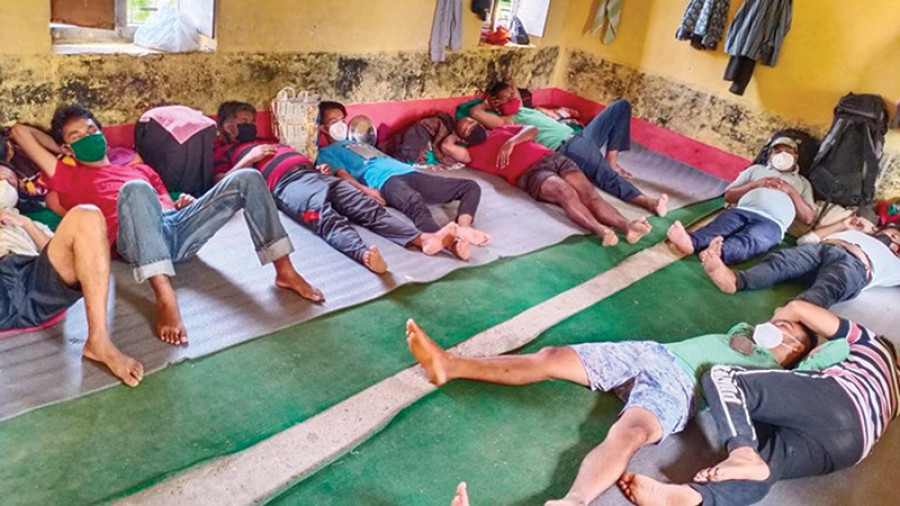Health
Quarantine centres are being closed as pandemic rages on
Public health experts say the importance of quarantine facilities has increased in the wake of the emergence of new coronavirus variants said to be more contagious and lethal.
Arjun Poudel
After the government enforced the nationwide lockdown to contain the coronavirus spread on March 24, the international airport as well as all international borders were shut down.
The lockdown went on for four months and hundreds of thousands of migrant workers, especially those returning home from India and the Persian Gulf, were barred from entering the country. The government had said at the time that there weren’t enough quarantine and isolation facilities to keep the people returning from abroad.
After July 21, the authorities finally allowed people to enter the country after the government lifted its four months long lockdown. But the management of the quarantine and isolation facilities was so poor that these facilities themselves became “breeding grounds for coronavirus.”
Instead of improving the condition of such facilities, people arriving from abroad were allowed to go home without spending a day in quarantine holding facilities. Most of the quarantine facilities throughout the country have mostly been closed today, although the risk of coronavirus spread is not over.
“The coronavirus risk has not gone down and the emergence of new variants of the virus in the United Kingdom and South Africa show that we still need such facilities,” Dr Sher Bahadur Pun, chief of the Clinical Research Unit at Sukraraj Tropical and Infectious Disease Hospital, told the Post. “The new variant of coronavirus detected in the UK and South Africa are said to be more infectious and more lethal.”
Many countries have closed their borders with the United Kingdom and South Africa and cancelled direct flights to and from the countries.
According to the BBC, the new variant of the virus detected in the UK could be 70 percent more infectious than other variants circulating across the world. South Africa is also struggling to contain a new wave of coronavirus infections, possibly linked to a genetic mutation of the virus.
Scientists studying the new variant of the virus believe that South Africa’s variant is more contagious than that seen in the UK and may affect young people more, and is maybe slightly more resistant to vaccines. There are also concerns that the South African variant of the virus could “re-infect” people who have already recovered after being infected.
“Even if we halt direct flight and ban entry from countries where the new variant of the coronavirus has spread, there are still chances of the new variant coming to Nepal, since it is impossible to close the border with India,” Pun added. “One single case of infection from the new variant of the virus will be sufficient to spread throughout the country.”
A lot of people, who were stuck on the Nepal- India land crossings for months, had entered the country during the nights hiding from the authorities. Those people had gone to their villages and transmitted the virus to their family members and other members of their community.
“Instead of learning lessons from the mistakes and weaknesses and correcting them, we have dismantled the quarantine and isolation facilities,” Dr Baburam Marasini, former director at the Epidemiology and Disease Control Division, told the Post. “We have now reached a pre-lockdown state, which is very unfortunate.”
A lot of people placed in quarantine became infected, and some fled and went to their villages.
According to Dr Marasini, permanent structures for quarantine and isolation facilities are still needed, as the risk of the coronavirus spread has not subsided and new variants of the virus are emerging.
“A lot of countries have enforced new lockdowns and restrictions after the second wave started there,” added Marasini. “If another round of lockdown happens in India, Nepali migrant workers, who went there recently will return again and we do not have any facilities to quarantine them.”
Doctors say infected people cannot be placed in home quarantine if the new variants of virus emerge in the country.
Even the Ministry of Health and Population has also said that the risk of infection has not subsided and quarantine and isolation facilities are still important.
“Yes, time has not come to shut down quarantine and isolation facilities,” Mahendra Prasad Shrestha, chief specialist at the Health Ministry, told the Post. “The ministry has deployed us (two chief specialists) to the provinces to ask agencies concerned to reopen the quarantines and isolation facilities.”
The Covid-19 Crisis Management Centre on Tuesday decided to ban flights from the UK in light of the new variant of the coronavirus that is causing terror across Europe and other parts of the world. Following the ban, the Health Ministry had issued an advisory asking returnees from the UK to mandatorily quarantine for 10 days.
Public health experts say that ad-hoc decisions like these have marred the Oli administration's response to the pandemic right from the beginning could be costly for the people and country.




 14.24°C Kathmandu
14.24°C Kathmandu















